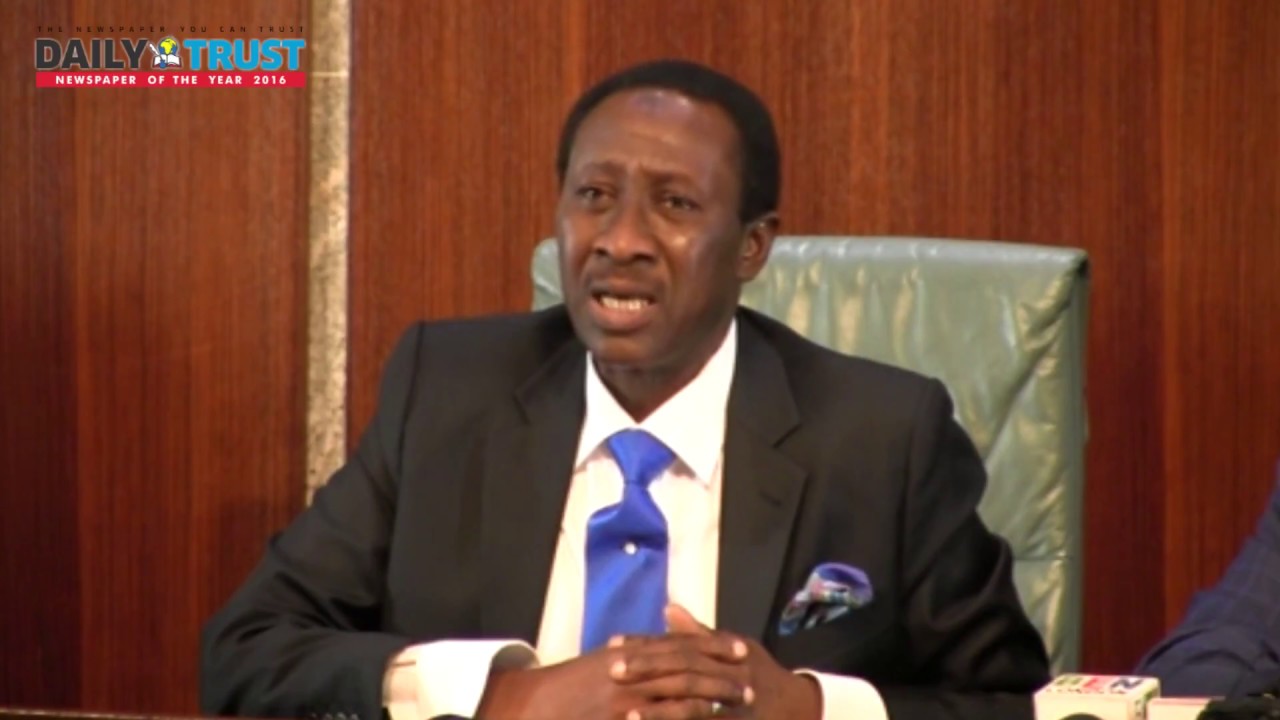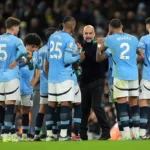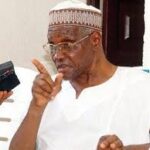The National Security Adviser’s revelation last week that billions disbursed for the procurement of military hardware have “gone missing” was an “aha!” moment for many Nigerians. For the past three years, two inverse variables have become so directly related that one would mistake them for bedfellows: the security threat ballooning together with the security budget. A textbook irony. The more taxpayers’ naira spent on security, the more Nigerians that get killed. The more you invest into security, the less secure the country becomes. As we sought to find an answer to this puzzling relationship, Major General Babagana Monguno’s explosive exposé provided the answer: massive security corruption on President Buhari’s watch.
The presidency swiftly plunged into panic. Monguno has let the cat out of the bag! It must be forced back or just killed. Reportedly after a serious rebuff from the presidency, Monguno hastened to “correct” the record. He issued a statement claiming he was “quoted out of context”. But the context clearly shows that he voluntarily brought up the issue of missing funds in response to an open question “if you don’t want to dialogue [with gunmen] why are you dilly-dallying in tackling the attacks by the gunmen?” asked by Abdussalam Ibrahim Ahmad of BBC Hausa. Monguno responded “It’s not dilly-dallying that caused this problem. The president has done his best by providing eye watering sums, but the hardware was not procured; they have not arrived. Now the president has brought in new people [service chiefs]. Maybe the new people will bring in new strategies. And I am not saying the immediate past service chiefs stole the money… But the money somehow went through some channels that I don’t know, and nobody knows presently.”
At this point, the journalist rightly followed up “Has the government investigated what happened to the money? To which Monguno replied, “I strongly believe the President will investigate it…” Abdussalam clarified further, “From all indications, arms money has been stolen” (using the same phrase in Hausa used by the Buhari administration to attack previous government over the 2.2 billion dollars DasukiGate). The NSA doubled down, “I can’t say so now since there is not any proper investigation. The only thing I can say is that the money is missing. The equipment has not been found and the new service chiefs said that they, in all honesty, didn’t see the equipment in question. Probably some of them may be coming from America, England, from everywhere, But, on the ground presently, I didn’t see them and they [new service chiefs] didn’t see them either.”
It is abundantly clear from the above that the context doesn’t avail the NSA. He was not tricked or pressed to reveal this information. Nor was he caught unprepared as this interview took place at a press briefing convened by him and this particular one was conducted in Hausa language, which the NSA knows well. Thus, the NSA’s claim that he was misquoted is untenable and dishonest. He simply sought to backtrack to save his job. That is why he deliberately lumped two separate issues in the retraction statement: whether he said billions are “missing” and whether it was under the previous service chiefs. While the NSA was not categorical that the former service chiefs were responsible for the missing money, he was more than unequivocal that the money is “missing”. He repeated this fact three times in a four-minute long interview. There is a case to argue that the NSA pointed the finger at the former service chiefs. But let’s not get derailed by an ancillary issue. The fundamental point is that billions of naira meant to fight terrorists and criminals massacring Nigerians have gone missing under Buhari. The identity of the culprit(s) doesn’t in any way dilute this monumental scandal.
In fact, the presidency could not wait for the NSA to backtrack. Garba Shehu was in damage control mode immediately. He falsely claimed on Channels TV that the NSA was misconstrued and mistranslated. I have listened to the NSA’s interview several times and have read the stories and verbatim translations rendered by this paper and several others. All the translations are identical and accurate, and the English reports on the interview did not misconstrue Monguno. Little wonder then that Garba Shehu did not provide what he thinks is the “accurate” translation. Instead, he went on a voyage of re-interpreting the NSA which damaged his case even further. He said Monguno meant that “we don’t have enough weapons”, which he admitted is “a statement of fact”. The logical questions that follow this line of spinning is: what happened to the trillions budgeted for defence since Buhari’s assumption of office? A record compiled by this paper shows that the Buhari administration has allocated over N4 trillion and another one billion dollars (over N380 billion) from the excess crude account to defence. Where is all this money? What has Buhari been doing for the past six years if our military still does not have “enough weapons”?
Besides, the admission is a clear contradiction of the presidency’s repeated declaration that it has given our heroes on the ground everything they need to successfully tackle criminality and terrorism. Even more untenable is the claim that “things like this cannot happen under a Buhari administration.” If the presidency, in its haste, has been forgetful, Nigerians haven’t, and won’t forget that it was under President Buhari that the grass-cutting scandal occurred. Despite several motions by the National Assembly calling for his removal, tons of investigative reports and outrage by Nigeria, Buhari and his enablers spent years defending Buhari’s secretary who awarded a contract worth more than N500 million to his own company to remove weeds from an internally displaced persons camp. The “grass-cutter” misappropriated funds donated to feed some of the most vulnerable people on earth, yet he was only removed when it became impossible to retain him.
If that story is too old for the government to recall, how about the president’s humiliation regarding Ibrahim Magu? Buhari violated the constitution to single-handedly appoint and keep Magu as our chief anti-corruption czar, in blatant disregard of several reports by his own intelligence agencies and rejections by the senate. After spending five years “fighting” corruption unconstitutionally, Buhari suddenly accused him of stealing what he had recovered, and removed him from office.
Going back to Monguno’s exposé, the Hausa proverb magana zarar bunu (a word spoken is like pulling out thatch: it cannot be put back) is apt. However, they might try, Monguno’s revelations cannot be undone. As the NSA and retired military general, for Monguno to have gone public with this issue, he must have raised it several times to the president. Thus, this claim cannot be dismissed with a wave of the hand. It behoves President Buhari to institute an independent audit of all defence spending from the beginning of his administration. Such an exercise should be transparently carried out by an internationally acclaimed auditing firm and their report published for all to see. If Buhari refuses to do this, it will present the greatest threat yet to his brag of being an “incorruptible” public servant. History will neither forgive nor forget. More practically, sweeping this under the carpet will negatively impact APC’s chances of winning the next election, and when another party takes over, the national disgrace that is BuhariGate will be investigated.

 Join Daily Trust WhatsApp Community For Quick Access To News and Happenings Around You.
Join Daily Trust WhatsApp Community For Quick Access To News and Happenings Around You.


